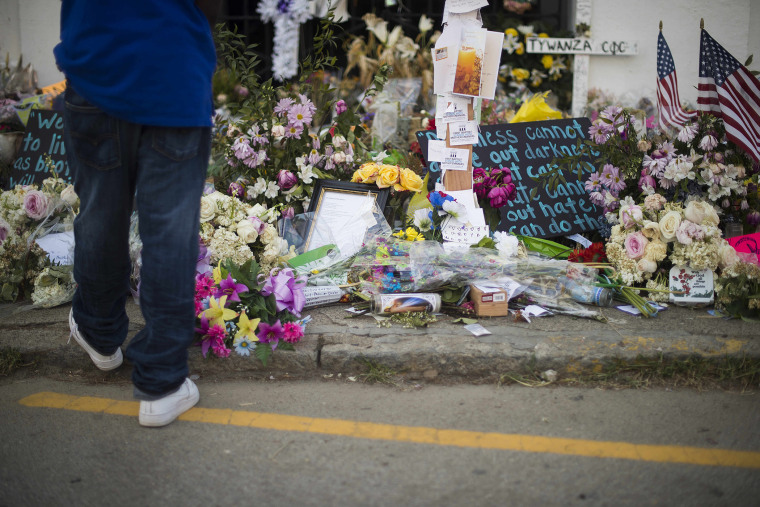The FBI indicated Wednesday that its ongoing investigation into the Charleston shooting could lead to domestic terrorism charges, depending on the facts uncovered by investigators.
After the shooting at Emanuel AME Church last Wednesday, federal authorities immediately announced a hate crime investigation. Many have questioned whether the inquiry should investigate the murders as domestic terrorism, from presidential candidate Hillary Clinton to the Republican Chairman of the House Intelligence Committee, Rep. Devin Nunes.
“Both hate crime and domestic terrorism investigations afford investigators the same set of tools and techniques,” FBI Spokesman Paul Bresson told msnbc on Wednesday. “Any eventual federal charges will be determined by the facts at the conclusion of the investigation, and are not influenced by how the investigation is initially opened.”
Related: The odd, ignoble history of the Confederate battle flag
The new statement suggests the federal inquiry could potentially include terrorism charges, even though it was initiated as a hate crimes investigation.
On Saturday, FBI Director James Comey said he didn’t see Charleston as terrorism, based on what he knew at the time.
“Terrorism is [an] act of violence … to try to influence a public body or citizenry, so it’s more of a political act. And again, based on what I know so far, I don’t see it as a political act,” Comey told reporters on a visit to Baltimore. “Doesn't make it any less horrific, the label, but terrorism has a definition under federal law,” he added.
Under federal law and the FBI’s own guidelines, however, domestic terrorism is defined by three elements: An illegal, dangerous act, committed in the U.S., intended to intimidate civilians or alter government policy. (Federal law defines and bans domestic and international terrorism, in 18 U.S. Code § 2331.) The actions of alleged shooter Dylann Storm Roof seem to fit the bill – a domestic mass murder to terrorize civilians in order to advance the political agenda of a “race war.” However, many critics and legal experts note that it is more quickly and vociferously applied to certain suspects — such as Muslim attackers — than others.
As a practical matter, Roof is currently within the South Carolina criminal justice system facing guns and homicide charges. The federal government, however, has been walking a delicate line since the shooting in defining its parallel investigation and where it could lead.
On Friday, a spokesperson for Attorney General Loretta Lynch said the DOJ was investigating the shooting as both “a hate crime and as an act of domestic terrorism.” Ultimately, it is up to Justice Department prosecutors to decide what federal charges to bring. The FBI also struck that note earlier this week, telling The Daily Beast its goal was to “follow the facts and learn more about the incident itself and what was behind it.”
Today’s FBI statement goes a bit further, directly acknowledging the potential case for applying the model of “domestic terrorism investigations” to the Charleston attack.
